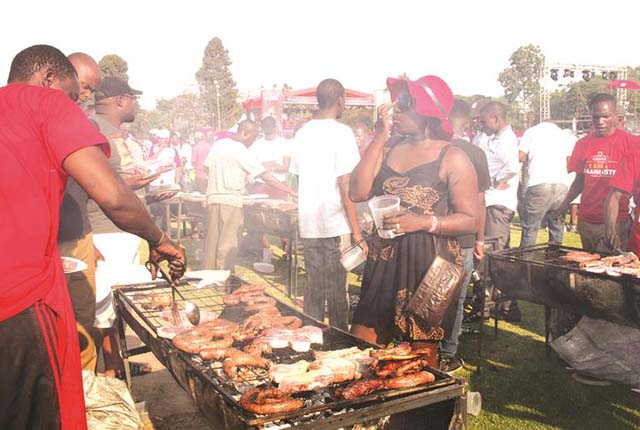Fixation with wealth, status in Zimbabwe


The fixation with wealth and status is the main driver of many of our ills
David Mungoshi: Shelling the Nuts
Zimbabwe has many paradoxes. You could say that at this point in time in the history of our beloved land, paradoxes define us. The juxtaposition of opulence with deprivation is somewhat conspicuous. And there is so much eating everywhere if what we see on the streets of Harare and elsewhere is anything to go by.People are hassling: bananas, oranges, apples, sweet potatoes, salted peanuts and even sadza with whatever you fancy — all on the street! When it’s mushroom time, the wild mushrooms (a traditional delicacy in peanut butter sauce and bits of chilli). For a dollar you can eat like a king in some of the food outlets. Sadza or rice with stewed beef and vegetables or sadza with roadrunner chicken and so on and so forth.
You can even have sadza with amasi (cultured milk) and choose your grain: finger millet, sorghum and so on. There’s a mighty big feast going on out there.
The question to ask is where all this stuff comes from? Are we importing roadrunners and everything else or are we eating what we call so to speak?
A trip to Murehwa, Chiweshe, Mutoko and Mudzi and even Domboshawa just outside Harare will reveal a vibrant alternative economy possibly worth millions and millions, but which no one has so far cared to document. If you go to Rusape or Marondera and even Mutare these things are in evidence everywhere. In Skies (Bulawayo) too, the people’s markets are bursting with activity.
This is a story that nobody writes about or researches. This is because alongside all this surfeit there is also so much deprivation everywhere. Miraculously, some might say, we have escaped the horrors of the hunger and famine that have regularly ravaged many peoples on the continent.
The story of Karamoja in Uganda and that of the Horn of Africa are well documented. The droughts in our part of the continent have been regular and vicious yet somehow the people survive. It must be something in the country’s DNA!
Before 1980 there were no measures put in place to mitigate the occasional famines such as the one in 1967 when even the trees wept themselves dry out in the countryside. There was firewood everywhere! The people sustained themselves and did the same throughout the period of the armed conflict in our country.
After 1980, true to the ideological stance that said we were our own liberators, the drought relief fund was put in place. So there was always something with which to address emergencies.
This mantra was carried forward by the AIDS levy. What I am saying is that the people have it within them to make a difference. They just need recognition, and they also need to benefit from their labour and not be waylaid by middlemen infamously known as “makoronyera”.
How the word “colonel” went into a fascinating phonological and semantic transformation is the story of another day.
Suffice to say the makoronyera brigade is peopled with suave conmen and fraudsters shamelessly fleecing farmers of the product of their sweat and grit. You should hear the stories from the tobacco auction floors. Good tobacco fraudulently rejected or bought for a song only to be resold later at much more realistic prices.
Quite a few tobacco farmers have sworn not to grow tobacco anymore, at least not until the whole scene is cleaned and fine-tuned.
Can you blame them?
When you have invested in your crop and then fail to break even at the end of the day, the headache of what you owe for inputs and fertilisers and so on weighs you down.
Too often people do not notice evil when it creeps in. This is probably because the aberration usually comes in so surreptitiously that you seldom notice it. If anything it usually is no more than a nuisance in the beginning, that is, until it takes over your life and your routines.
The scourge of the middleman began many years ago in places like Gokwe, Karoi and Rushinga where cotton, the white gold, had become a game-changer and the good times were rolling. After the cotton was sold and there was money in the pocket the peasants bought more cattle, built better homes and filled them with luxury goods including radio and television.
Some men married more women and suicides were not uncommon after the cotton sales. Feeling slighted and cheated after all the hard work they had put in some women took their lives in protest. That is a fertile area for sociologists and other social scientists to explore.
Who knows how many wandering spirits (ngozi) there might be out there? A Rushinga girl from one of the primary schools once wrote a poem about this tragedy.
Anyway, it was precisely because of the “easy” money in cotton that the middlemen hired lorries and haulage trucks, invaded the countryside and with their ready money enticed the peasants to let go of their cotton.
Few were able to resist this ready cash with which they could solve pressing problems. And when the cotton largess diminished these mavericks shifted base and moved on to tobacco! Somewhere along the line we had these pyramid schemes that keep re-surfacing every so often, including quite recently.
The thing about these pyramid schemes is knowing that the early bird always catches the worm. The ones who start the scheme going always reap something and after they make their killing there is a deafening silence.
I am thinking of all the people in recent times who got themselves onto the mobile credit card in order to be able to take part in a scheme that was reputed to have made millions for many.
Now nobody talks about that scheme. There will be many that are probably regretting their gullibility as we speak. But no, soon after that there was another scheme in which you could spend as little as two dollars at a time and presumably make your fortune. Right now there is silence.
The idea of schemes is as old as of luxury and laziness with human beings forever taking gambles with their resources.
In Thomas Hardy’s Mayor of Casterbridge we have a character who gambles away his wife. That may sound a little far-fetched but there’s no saying what man will do under certain circumstances, particularly if gain is in sight.
In Shona they talk about eating the food of the foolish.
This is an affirmation of the age old adage about a fool and his money being soon parted. There are many prodigal sons all over the place, just as there are many stories of the newly-rich who soon lose their incidental wealth.
The state lottery and the famous July Handicap made many rich. A man called Chinzara hit the jackpot in the state lottery, a princely sum of all of 50 thousand pounds.
The whole of Bulawayo was abuzz with news of how he had gotten lucky and won the big prize. The ending of the Chinzara story is a familiar one that was duplicated again and again over time.
Chinzara’s fortune dissipated and he was to spend the rest of his life foraging for food in the rubbish bins that were known as “amadodbox” in Bulawayo.
The imagery of that is decidedly scatological!
In more recent times we have been witness to all sorts of phenomena.
The last decade has been something of a hell run for most Zimbabweans and predictably Zimbas have reacted in quite some creative ways to the whole hullabaloo and pandemonium.
Nowhere else have people ever made money by burning it. It was a whole new phenomenon that created fabulously rich people overnight. Some bought luxury cars and fixed assets using this “burned” money. One wonders what it is that motivates Zimbabweans to these heights or doldrums, whichever one prefers.
I thought of this the other day when I came across a story in which one-time Nigerian President Olusegun Obasanjo was talking about how he had intended to create 50 billionaires in Nigeria but unfortunately created only 25.
This in a country that at the time was not too far from hitting the 200 million mark in terms of its population. The fixation with wealth and status is the main driver of many of our ills. The boy who killed his mother in Gweru and is now languishing in jail is said to have been part of a satanic cult.
He believed that he had to do bizarre and macabre things like killing his mother in order to suddenly realise fabulous riches. The Mvuma case is another one in which Satanism was cited. One wonders if life boils down to just these things. A new paradigm is necessary, something honest and wholesome to prevent becoming prophets and charlatans.
David Mungoshi, an applied linguist and teacher of long standing is also a published poet. Short story writer and award-winning novelist.








Comments